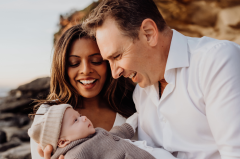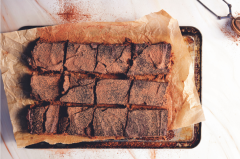Navigating infertility, Sheila Vijeyarasa redefined success, motherhood and her self-worth. Her IVF journey meant surrendering old expectations, embracing the unknown and finding deep transformation through adversity.
It’s not every day you find yourself being filmed on the toilet, trying to urinate on a pregnancy test strip. Yet Sheila Vijeyarasa found herself in exactly that situation. In her latest book, The Power of Little Steps, she writes, “As I sit here, with a camera capturing every awkward angle, I can’t help but wonder: ‘How did I get here?’ ‘This wasn’t the plan!’”
This intimate moment was being filmed for Channel 9 documentary Big Miracles, a behind-the-scenes look at the hope and heartbreak of infertility and in-vitro fertilisation (IVF). According to IVF Australia, “One in six Australian couples of reproductive age experience difficulties conceiving a child.” For so many couples and single women, becoming a parent requires an incredible amount of medical intervention.
This was certainly true for Vijeyarasa and her husband Tyson Salijevic. While they knew IVF would be difficult, they had no idea how physically and emotionally exhausting it would be. They didn’t know how much grief they would face or the bravery they would need to become parents.
The IVF journey
At age 38, Vijeyarasa had a successful career and was in a serious long-term relationship. However, when that relationship ended, she wasn’t ready to give up her dream of becoming a mum, so she froze her eggs. It wasn’t until she was 45 that she met her husband-to-be, Salijevic, who was 46. While they met later in life, they fell in love quickly.
Within three months, they were consulting with IVF Australia to start their journey to become parents. They began by using the eggs that Vijeyarasa froze. From her 11 frozen eggs, only one viable embryo formed, and sadly it didn’t result in pregnancy. From there, they harvested her eggs. But at age 46, the odds were stacked against them. They tried six rounds of IVF using her eggs, but unfortunately each attempt failed to produce a pregnancy. It was a heartbreaking process for the couple.
On their final round of IVF using her last egg, the Big Miracles cameras were rolling as Vijeyarasa did a home pregnancy test. The tension was palpable. When the cameras zoomed in and “not pregnant” appeared on the test strip, she buried her head in her husband’s shoulder, sobbing, “No, no, no!”. He took her in his arms and kissed her softly on the head. In that moment, they both knew that their dream of starting their own family was over.
Pivoting to Plan C
Their last IVF failure was devastating for the couple. “When things didn’t go as planned, it felt like the ground had been ripped out from beneath me,” Vijeyarasa says. “We felt betrayed, like utter failures. There’s a rawness when you realise the life you envisioned is slipping through your fingers, and no amount of effort can force it back into place.”
Even with incredible medical advancements, there’s still no guarantees with IVF. “This was a humbling realisation and forced me to reframe my expectations and lean into the deeper lessons of resilience and surrender,” Vijeyarasa says. To continue their journey, the couple needed to pivot to Plan C.
Their doctor suggested they consider conceiving using an egg donor. “It all felt scary and foreign,” Vijeyarasa says. “You’re going against the natural order of things. I worried the child wouldn’t love me, but deep down my biggest fear was that I wouldn’t love the child.”
It took time and deep soul searching for Vijeyarasa to consider having a child that wasn’t biologically hers. She says, “To embrace a Plan C mindset meant letting go of what I thought life should look like and leaning into the possibilities of what could be.”
Navigating grief and loss
Arriving at acceptance wasn’t easy. Vijeyarasa went into a grieving process for about three months when she realised she wouldn’t be able to conceive a child with her own eggs. “With IVF, the big grief is the first failed pregnancy test, and then after that it’s all compounding grief,” she says.
“Grief felt like a heavy all-encompassing fog that I couldn’t shake — a tsunami of energy. It would hit from the beginning of the day. When I would open my eyes in the morning, the first thing I would say is ‘I’m not a mother and I don’t know if I ever will be’.” Feeling scared and exhausted, she says, “I’d just roll over and pull the sheets over my head — I couldn’t face the day.”
As she navigated her grief, Vijeyarasa says, “I allowed myself to cry. I didn’t push it away or pretend it didn’t hurt. I leaned into the pain, knowing that healing begins with acknowledging the loss.” Facing the possibility she might not become a mother, she says, “I was grieving all the memories you imagine you will create as a parent and all the future milestones, like the first day of kindergarten, Christmas and vacations.”
Brave little steps
As overwhelming as this time was, Vijeyarasa chose to focus on small things she could do. She calls these her “little brave acts”. In her book, she defines these as, “Those small, gutsy moves that keep us going, even when life feels like a hot mess.” She says, “One of the most transformative lessons for me was understanding that bravery isn’t about a single, big, heroic act. It’s about taking one little step, then another.”
For Vijeyarasa, this meant starting her day asking, “What’s the little brave thing I could do today?”. Some days that meant dragging herself out of bed at 5am, changing out of her pyjama pants, putting on her sneakers and going for a walk, knowing no one would be around to see her. Other days she would go to yoga, meditate, go for a run or a brisk walk. Moving her body was an essential part of her healing process.
Her husband became her rock, helping her navigate this dark time. “Tyson reminded me of the power of partnership — of having someone by your side who believes in you even when you’re struggling to believe in yourself,” she says. “There were times I felt like I was free-falling into the abyss, but Tyson was always there to remind me that I wasn’t navigating this alone.”
Cocoon of healing
Essential to Vijeyarasa’s healing process was giving herself time in solitude and reflection, a phase she calls the “cocoon of healing”. She says, “When we’re in the winter of our life, we’re meant to turn down the noise of everything else around us. Cocooning means creating the conditions for deep healing and reflection. It’s where we do quiet, unseen work t





